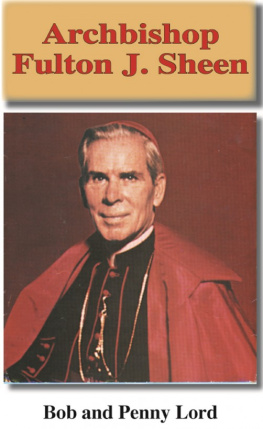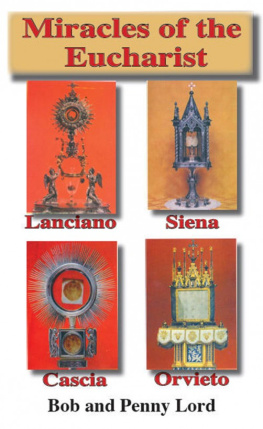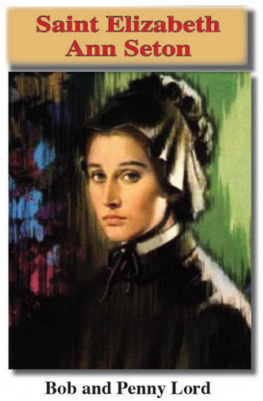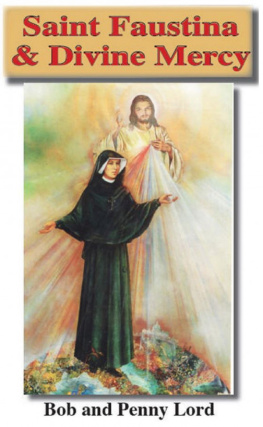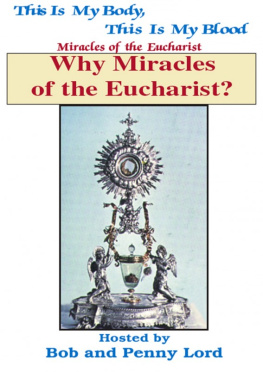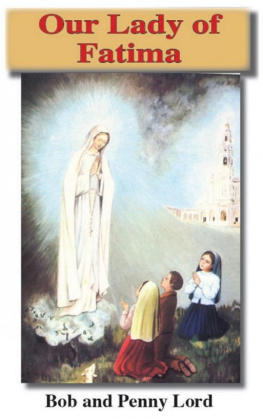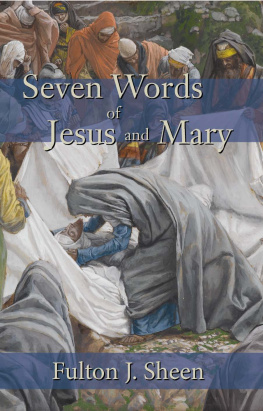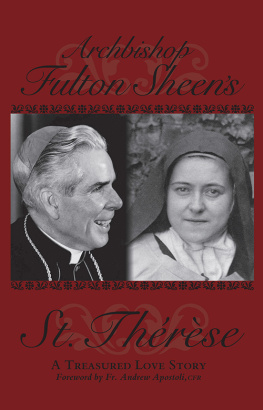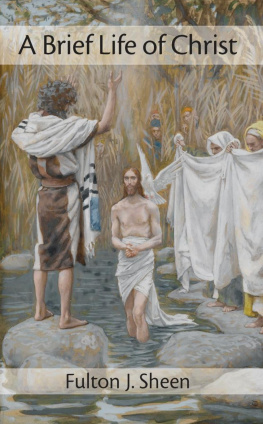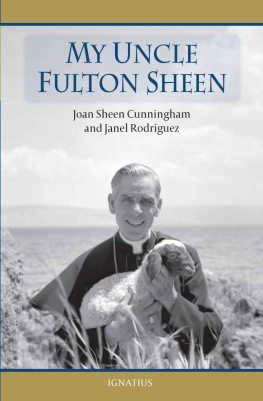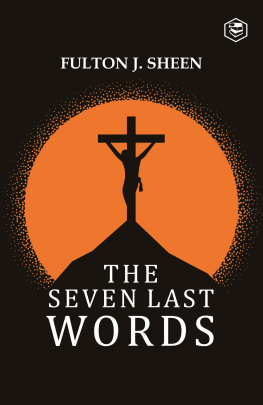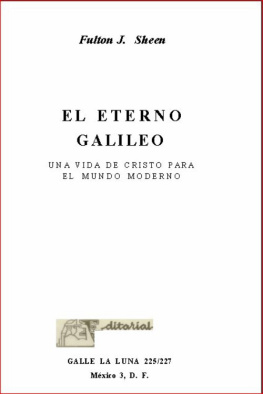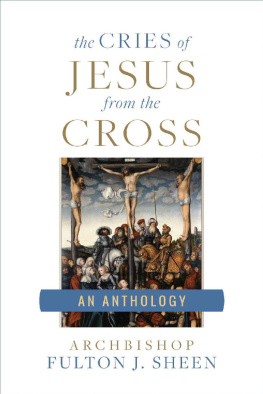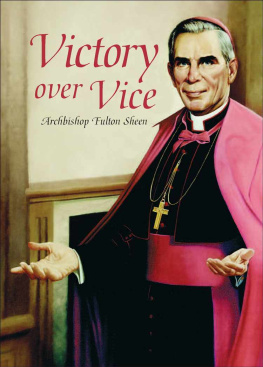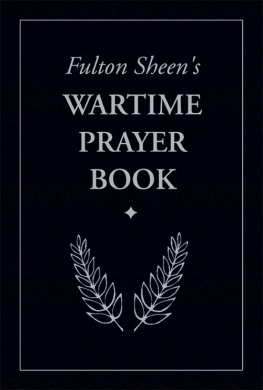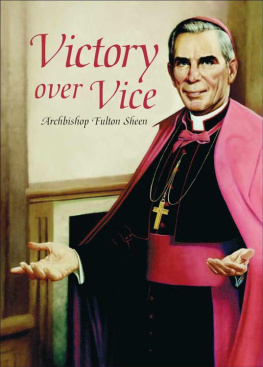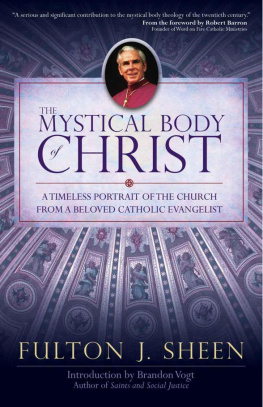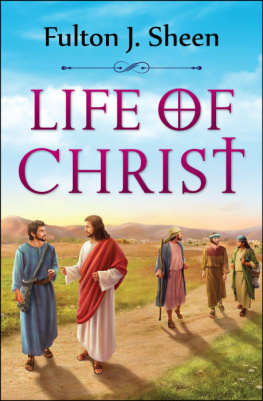Archhbishop Fulton J. Sheen
Bob and Penny Lord
Published by Bob and Penny Lord atsmashwords.
Copyright 2011 Bob and Penny Lord
Discover other titles by Bob and Penny Lordat http://www.smashwords.com/profile/view/bobandpennylord
This ebook is licensed for your personalenjoyment only. This ebook may not be re-sold or given away toother people. If you would like to share this book with anotherperson, please purchase an additional copy for each recipient. Ifyou are reading this book and did not purchase it, or it was notpurchased for your use only, then please return to Smashword.comand purchase your own copy. Thank you for respecting the hard workof the author.
Archbishop Fulton J. Sheen
Prophet, Priest, a man for all Seasons
We could not think of writing a book aboutSaints and Powerful Men who have changed the course of our livesand not include Archbishop Fulton J. Sheen. I must admit I neverwatched Fulton J. Sheen on television, nor was I influenced by himwhile he was alive. But, as we began to discover our Catholic Faithas adults, his words, and his living out of those words, became astrong part of our journey of faith toward new life in theLord.
Unto us a Prophet is born
It was 1895, in the month of Mary; onecentury was ending and another beginning; and with its beginning,was the need of a voice in the desert, crying out, proclaiming theWord of God. Fulton J. Sheen was to be that voice. The prophet,whose words and voice would ring out for all time and place, wasborn above the family's hardware store in El Paso, Illinois.
Fulton J. Sheen was brought up on the need ofputting in a good day's work. It was not the hard work he minded;it was that the hard work was done on a farm. Out of necessity, hisfamily had moved to a farm (after a fire had destroyed theirstore). Whereas his brothers loved to work on the farm, Fultonsuffered it. A neighbor once told his father, he (Fulton J. Sheen)would never amount to much; his head was always in a book.
His early years on the farm ended, when thefamily moved to Peoria to be near a fine parochial school for theirchildren. Although not well-educated themselves, his parentsinstilled the need and love of higher learning in theirchildren.
The making of a Priest
When Bishop Sheen wrote of his life, he wroteas a priest, "a man with a body of soft clay, to be stretched outon a cross of fire (in order to remain a pure treasure)." Speakingof God choosing him for the priesthood, when there were thousandshe (Sheen) knew more deserving, he humbly said, "God's love isblind." He wrote, "God purposely chose weak instruments so it wouldbe clear that the work was not being done by the clay but by thePotter."
The molding of the clay, as Bishop Sheenliked to refer to his life, was done by great sacrifice on the partof his parents. Very often, they denied themselves even thesmallest comforts so their children would be well dressed and caredfor. His family was a holy family; they said Grace before and aftereach meal. Respecting each other and the solemnity of their mealtogether, the men of the family always came to the table wearingjackets. They prayed the Rosary together as a family in theevening. Each week, they entertained priests from the Cathedral.The children were either surrounded by the strong affirminginfluence of holy priests, their immediate holy family, or closecousins from the country who would visit them.
One day, while serving as Altar boy to BishopSpaulding, he dropped a glass cruet on the marble floor of theCathedral. You'd think the incident would have lost its sting tothe Archbishop recounting it, with 60 years as a priest behind him.But, in his autobiography Bishop Sheen shares, no atomic explosioncould equal the deafening sound of that cruet falling, in aCathedral, in front of a Bishop! When the Mass was over, BishopSpaulding called the stunned boy to him and asked Fulton where heplanned to go to school, when he was big. Being all of eight yearsyoung, Fulton thought the Bishop meant High School big, and so heanswered, Spaulding Institute (named after the Bishop). The Bishoptold the boy to go home and tell his mother he was to go to TheUniversity of Louvain; he also prophesied that some day he would bejust like him. Fulton J. Sheen forgot the Bishop's words until twoyears after he was ordained to the priesthood, when he enteredLouvain University.
Archbishop Sheen said he could never remembera time he did not want to be a priest. He attributed as majorcontributions to his becoming a priest: first, as a child, being anAltar boy in the Cathedral; second, growing up, the example of theHoly priests who visited his family; and third, daily recitation ofthe Rosary. The only doubt he had was his unworthiness, but thatdoubt was strong enough to drive out and drown out the Voice thatpersisted, that same Voice that called to Samuel. But here, we haveanother strong message that goes out to the whole world, that Godchooses you; you do not choose God. And when He wants you, you canrun but you cannot escape. The Persistent Lover is that Whisper inyour heart, that Wind at your back, and Fulton J. Sheens of theworld, you are on your way to becoming priests.
"If society calls, I can stop service(serving); if Christ calls, I am a servant forever." By the graceof God, On Saturday, September 20, 1919, Fulton J. Sheen becameFather Fulton J. Sheen.
Immediately after ordination, he went toCatholic University in Washington. After studying philosophy fortwo years, he shared his concern with his professor; he would nothave the education necessary to merit the degree, Doctor ofPhilosophy. The professor asked him, "What would you wish fromeducation?" He replied, "...two things - first, what the modernworld is thinking about; second, how to answer the errors of modernphilosophy in the light of the philosophy of St. Thomas(Aquinas)."
His professor's answer, "You won't get ithere, but you will get it at the University of Louvain in Belgium,"was to fulfill part of Bishop Spaulding's prophecy; Father Sheenwas on his way. Not only did he receive a Doctorate at theUniversity of Louvain, but graduated, receiving the most covetedaward that can be given, "Very Highest Distinction." He received,as well, two offers to teach; one, in London and the other atColumbia University. When he wrote to his bishop asking which heshould accept, the bishop replied, "Come home!"
He returned home from Europe. All theeducation and honors behind him, home became a parish in that partof the city called the "lower end." All the well-to-do parishionershad fled the little church, he was sent to, but it soon becamecrowded as these same people came back to hear the young priestpreach. The pastors from the other parishes forbade theirparishioners to go; they ordered, "Stay in your own parish."
As Father Sheen's preaching became wellknown, even the newspapers started to question, "Why has thispriest with so much talent and obvious education been hidden awayhere?" Finally, one day, the Bishop called in Father Sheen and toldhim, he was keeping the promise he had made three years ago toBishop Shahan, and was sending him to be on the faculty of CatholicUniversity. When Father Sheen asked why he hadn't sent him in thefirst place, the bishop answered he wanted to see if he wouldobey.
Looking back over his years of studyingvocations, he found that, in his case and in those of many others,they thought they had a vocation because they wanted to "work amongthe poor" or "defend the political rights of prisoners " or "bringa religious mission to the political-minded in South America." Hediscovered "no true vocation starts with `what I want' or with `awork I would like to do,' but with God." As the Lord pruned away atany ego he might hold on to, he lived the reality of his ongoing"yes" to the Lord, his words, "If we are called by God, we may besent to a work we do not like, and obedience is better thansacrifice."

